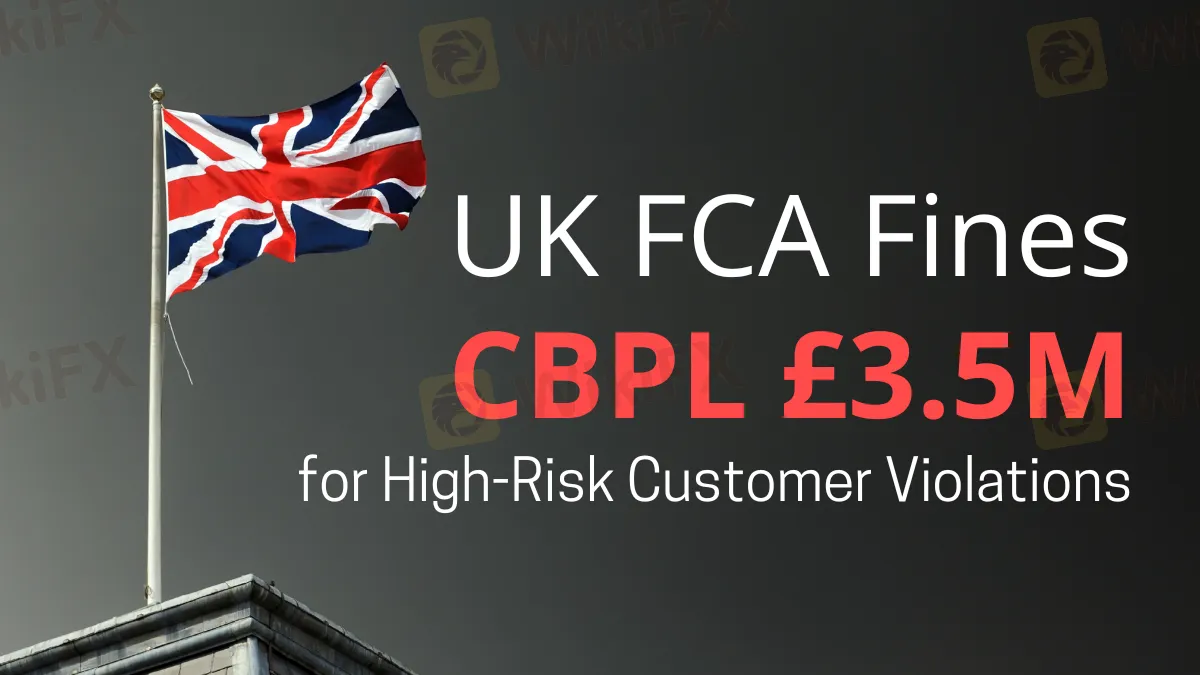简体中文
繁體中文
English
Pусский
日本語
ภาษาไทย
Tiếng Việt
Bahasa Indonesia
Español
हिन्दी
Filippiiniläinen
Français
Deutsch
Português
Türkçe
한국어
العربية
UK FCA Fines CBPL £3.5M for High-Risk Customer Violations
Abstract:The UK FCA has fined CBPL £3.5M for onboarding high-risk customers, violating regulatory requirements, and weak financial crime controls.

The Financial Conduct Authority (FCA) fined CB Payments Limited (CBPL), a member of the Coinbase Group, £3,503,546 for failing to comply with regulatory standards. The good outcomes of CBPL's inability to follow guidelines prevented it from providing services to high-risk clients.
CBPL provides a worldwide crypto asset trading platform but does not directly handle crypto-asset transactions. Instead, it allows customers to access these transactions via other Coinbase Group firms. CBPL needs to be registered in the United Kingdom to conduct crypto-asset transactions.
CBPL Exceeds High-Risk Levels
Following negotiations with the FCA, CBPL agreed on a voluntary requirement (VREQ) in October 2020. This criterion was motivated by worries regarding the efficiency of CBPL's financial crime control structure. The VREQ expressly forbade CBPL from onboarding new high-risk clients until its control mechanisms could be improved.
Despite this prohibition, CBPL accepted and served 13,416 high-risk clients with e-money services. Approximately 31 per cent of these consumers made deposits totalling USD 24.9 million. These monies were then utilized for withdrawals and crypto asset transactions via other Coinbase Group firms, totalling about USD 226 million.

CBPL violated the VREQ by failing to develop, test, implement, or monitor appropriate controls, resulting in the first FCA fine under regulations. The company should have considered all possible onboarding techniques and effectively monitored compliance. As a result, several severe breaches went unnoticed for almost two years.
Therese Chambers, the FCA's Joint Executive Director of Enforcement and Market Oversight, underscored the seriousness of the situation: The money laundering concerns linked with cryptocurrency are evident, and enterprises must take them seriously. Firms that support crypto trading, such as CBPL, must have rigorous financial crime controls.
Chambers said, “CBPL's controls had major flaws, which is why the restrictions were enforced. CBPL, on the other hand, consistently violated these rules. This enhanced the likelihood that criminals would utilize CBPL to launder their money. We will not allow such leniency, which endangers the integrity of our markets.”
Conclusion
This is the FCA's first enforcement action under the 2011 Electronic Money Regulations. CBPL agreed to remedy the situation, which resulted in a 30% reduction in the punishment. The FCA's decisive action emphasizes the significance of financial solid crime controls in the fast-changing crypto asset business.
For trending news, access the daily news on the financial market here.

Disclaimer:
The views in this article only represent the author's personal views, and do not constitute investment advice on this platform. This platform does not guarantee the accuracy, completeness and timeliness of the information in the article, and will not be liable for any loss caused by the use of or reliance on the information in the article.
Read more

The Hidden Checklist: Five Unconventional Steps to Vet Your Broker
Forex broker scams continue to evolve, employing new tactics to appear credible and mislead unsuspecting traders. Identifying these fraudulent schemes requires vigilance and strategies beyond the usual advice. Here are five effective methods to help traders assess the legitimacy of a forex broker and avoid potential pitfalls.

Doo Financial Obtains Licenses in BVI and Cayman Islands
Doo Financial, a subsidiary of Singapore-based Doo Group, has expanded its regulatory footprint by securing new offshore licenses from the British Virgin Islands Financial Services Commission (BVI FSC) and the Cayman Islands Monetary Authority (CIMA).

CFI’s New Initiative Aims to Promote Transparency in Trading
A new programme has been launched by CFI to address the growing need for transparency and awareness in online trading. Named “Trading Transparency+: Empowering Awareness and Clarity in Trading,” the initiative seeks to combat misinformation and equip individuals with resources to evaluate whether trading aligns with their financial goals and circumstances.

Malaysian-Thai Fraud Syndicate Dismantled, Millions in Losses Reported
The Royal Malaysia Police (PDRM) has received 26 reports concerning the Nicshare and CommonApps investment schemes, both linked to a major fraudulent syndicate led by a Malaysian citizen. The syndicate’s activities came to light following the arrest of its leader by Thai authorities on 16 December.
WikiFX Broker
Latest News
ASIC Sues Binance Australia Derivatives for Misclassifying Retail Clients
Top 10 Trading Indicators Every Forex Trader Should Know
WikiFX Review: Is FxPro Reliable?
Malaysian-Thai Fraud Syndicate Dismantled, Millions in Losses Reported
Trading frauds topped the list of scams in India- Report Reveals
AIMS Broker Review
The Hidden Checklist: Five Unconventional Steps to Vet Your Broker
YAMARKETS' Jingle Bells Christmas Offer!
WikiFX Review: Something You Need to Know About Markets4you
Revolut Leads UK Neobanks in the Digital Banking Revolution
Currency Calculator


